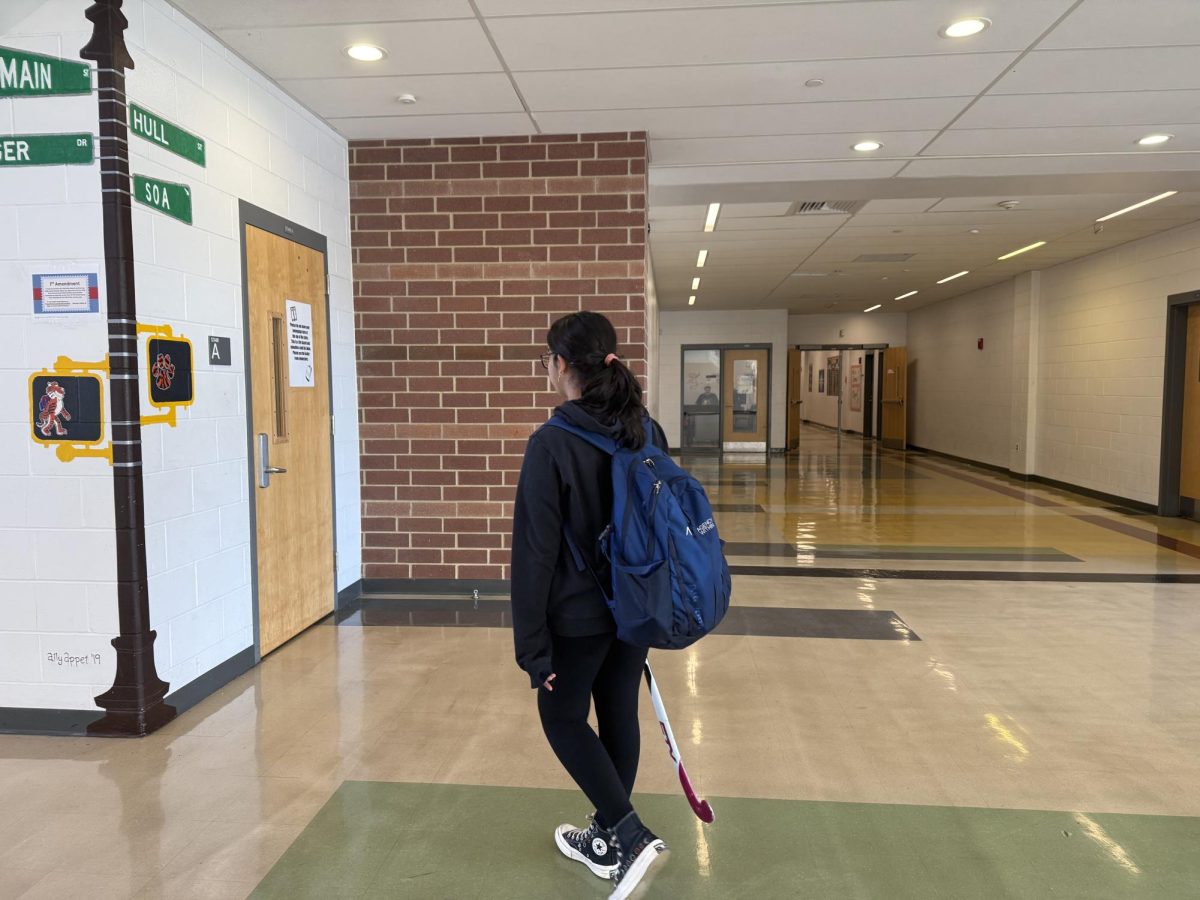by Hilary Brumberg
 [/media-credit]
[/media-credit]
- Seniors Alyssa Kaplan and Emily Paley enjoy lunch in the Tiger’s Loft Bistro. this April, the Tiger’s Loft began serving students again after it closed to students for three months as a result of contract complications.
Over the last four years, this school’s administration has instituted various policies that have shaped the school community. It is sometimes difficult to remember what this school was like before these rules and regulations were instituted.
For example, when students see one of their teachers’ names on the absent faculty members list, they gleefully rush to the cafeteria to sign in. Many upperclassmen make a beeline to the Library Learning Commons or Newtonville, while freshmen and students who do not have open campus privileges begrudgingly sit in the cafeteria under campus aides’ watchful supervision.
However, the cancelled class policy has not always been this way.
Until the 2008-2009 school year, this school funded daily substitutes for absent teachers. When a Proposition 2½ budget override did not pass in the spring of 2008, this school eliminated daily substitutes as a cost-saving measure. From that point on, students were required to report to the cafeteria when their teachers called in absent.
Also during the Class of 2012’s freshman year, the Student Faculty Administration had ongoing discussions about the N-rule, many of which focused on how the elimination of substitute teachers affected the rule.
The debate culminated in May 2009 with the final draft of the N-rule, which emphasized consequences for unexcused absences and eliminated the rule that three tardies amount to a cut.
Until the beginning of the current senior class’ sophomore year, students were required to take physical education/health and wellness for seven of the eight semesters of their time here. In 2010, the physical education/health and wellness requirements were lowered from seven semesters to five as a result of budget cuts.
In the fall and winter of 2009, there was a dramatic increase in trash left on Main Street during lunch block. To combat the increasing trash problem, Main Street was closed November 12 and November 13, 2009 during lunch block. Posters reminded students to clean up after themselves, and administrators threatened to close Main Street during lunch blocks again if students did not resolve the problem by December break.
“Students are just not taking care of their trash,” Riley housemaster Mark Aronson said at the time. “I understand the occasional chip that falls on the floor, but there’s no excuse for trays, bottles, bags, half-eaten sandwiches and things like that being left on the ground.”
With the move to the new building, students are allowed to eat only in the cafeteria and the Tiger’s Loft Bistro.
Many iPods, iPads, laptops and cell phones mysteriously disappeared from backpacks and classrooms in 2010. That June, the School Committee instituted a security policy that allowed this school to install surveillance cameras as a deterrent to crimes, including theft and assault.
The cameras were placed in “public areas such as hallways, athletic areas, large public gathering spaces, parking lots and public walkways,” principal Jennifer Price said at the time. The tapes can only be viewed by the superintendent and other authorized personnel, she said.
Until January 2011, an in-house department of school municipal staff ran the Newton Public Schools’ lunch program. However, the NPS’s lunch program had run an annual deficit of $1 million for two years, so to eliminate the deficit, the NPS contracted all food service operations to Whitsons Culinary Group.
February 7, 2011, Whitsons reinstated the breakfast program, which the School Committee had cut earlier that year due to the budget deficit.
Budget woes continued into the class’ junior year when the School Committee passed a budget that included non-athletic school-sponsored extracurricular activity (club) fees, drama fees and increased school-sponsored sports fees at the high school level.
Starting with the members of the current Class of 2012, seniors are required to take full-year English classes. Previously, seniors took two semester-long English electives, which were open to sophomores, juniors and seniors.
English department head Melissa Dilworth said the change was necessary because “while all other years of English classes at this school have clear structures, themes and core texts, the senior year did not. We had what some deemed ‘regular’ English classes coupled with electives.”
Starting this year, the use of Google Docs became more widespread at this school because the NPS Instructional Technology department set up educational Google Docs accounts for all students and teachers in the system.
“Google Docs give all students the same tools despite different equipment, so they are a big equalizer,” K-12 instructional technology coordinator Missy Costello said at the time. “Students can collaborate at home with the same tools and work on projects at the same time.”
This school continued to transition into the digital age third term this year by distributing report cards, warnings and attendance records online. Families can access this information through the online system ParentCONNECT.
During much of this past winter, the Tiger’s Loft was closed to students because of complications regarding federal regulations and the City’s agreements with its contractors, according to career and vocational technical education director Diana Robbins.
In April, NPS administrators and Whitsons’ management were able to reach an agreement that allowed the Tiger’s Loft to begin serving lunch to students again, according to Cynthia Bergan, assistant superintendent of secondary education and special programs.









































